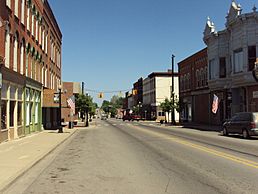Hudson Downtown Historic District facts for kids
|
Hudson Downtown Historic District
|
|

Looking east along West Main Street (M-34)
|
|
| Location | Hudson, Michigan |
|---|---|
| NRHP reference No. | 74000992 |
Quick facts for kids Significant dates |
|
| Added to NRHP | December 24, 1974 |
The Hudson Downtown Historic District is a special area in the city of Hudson. It's located in Lenawee County, Michigan. This district is important because it keeps the history of Hudson's downtown alive. It was recognized as a Michigan Historic Site on January 21, 1974. Later that year, it was added to the National Register of Historic Places on December 24, 1974. This list helps protect important places across the United States.
Contents
The Story of Hudson's Downtown
How Hudson Began
The story of this district began when the first railways arrived in Hudson in 1837. Merchants started opening shops and businesses here in the early 1840s. By 1853, Hudson was officially set up as a village. It became a very important place for trading goods from 1854 to 1891.
Fires and Rebuilding
Many of the first buildings were made of wood. A big fire in 1858 destroyed most of them. After the fire, people rebuilt with stronger materials. They put up two- and three-story brick buildings instead. Another fire in 1864 burned down even more of the remaining wooden buildings.
The oldest building still standing in the district is the J. K. Boise Dry Goods Company block. You can find it on the southeast corner of West Main and Church streets. It was built between 1854 and 1855.
What You'll Find in the District
Exploring the Area
The Hudson Downtown Historic District covers a specific part of the city. It includes West Main Street, which is also known as M-34. The district stretches from Howard Street on the west to Market Street on the east. It also goes north to Railroad Street and south to Seward Street.
The Dr. Leonard Hall House used to be at 334 West Main Street within this district. However, that building is no longer there.
Buildings and Architecture
This historic district has about fifty buildings. Most of these buildings are great examples of how towns in the Midwest looked in the 1800s. The majority of them are two or three stories tall. They were built for businesses and offices.
Most of these buildings are made of brick. But you can still see some older wooden buildings on Church Street. They show us what the town looked like a long time ago.
 | Sharif Bey |
 | Hale Woodruff |
 | Richmond Barthé |
 | Purvis Young |



